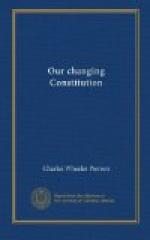The Court, however, has had great difficulty with these cases and developed sharp differences of opinion. For example, the case upholding the anti-lottery statute as a valid exercise of the power to regulate commerce[1] was twice ordered for reargument and finally decided by a bare majority of 5 to 4. The Child Labor Law of 1916 was declared unconstitutional[2] and the Narcotic Drug Act was sustained[3] by a similar vote, 5 to 4. In the Narcotic Drug case the four dissenting justices, speaking through Chief Justice White, characterized portions of the statute as “beyond the constitutional power of Congress to enact ... a mere attempt by Congress to exert a power not delegated, that is, the reserved police power of the states.” In the Lottery case the dissenting opinion of the four, written by Chief Justice Fuller, concludes:
I regard this decision as inconsistent with the views of the framers of the Constitution, and of Marshall, its great expounder. Our form of government may remain notwithstanding legislation or decision, but, as long ago observed, it is with governments, as with religions, the form may survive the substance of the faith.
[Footnote 1: Champion v. Ames, 188 U.S., 321.]
[Footnote 2: Hammer v. Dagenhart, 247 U.S., 251.]
[Footnote 3: United States v. Doremus, 249 U.S., 86.]
Whatever view one may hold to-day as to the question of expediency, no thoughtful mind can escape the conclusion that, in a very real and practical sense, the Constitution has changed. In a way change is inevitable to adapt it to the conditions of the new age. There is danger, however, that in the process of change something may be lost; that present-day impatience to obtain desired results by the shortest and most effective method may lead to the sacrifice of a principle of vital importance.
The men who framed the Constitution were well advised when they sought to preserve the integrity of the states as a barrier against the aggressions and tyranny of the majority acting through a centralized power. The words “state sovereignty” acquired an odious significance in the days of our civil struggle, but the idea for which they stand is nevertheless a precious one and represents what is probably America’s most valuable contribution to the science of government.
We shall do well not to forget the words of that staunch upholder of national power and authority, Salmon P. Chase, speaking as Chief Justice of the Supreme Court in a famous case growing out of the Civil War:[1]
The preservation of the states, and the maintenance of their governments, are as much within the design and care of the Constitution as the preservation of the Union and the maintenance of the National Government. The Constitution, in all its provisions, looks to an indestructible Union composed of indestructible states.
[Footnote 1: Texas v. White, 7 Wall., 700.]




